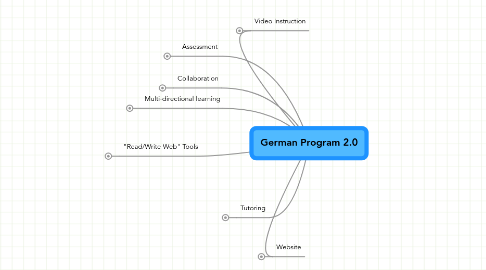
1. "Read/Write Web" Tools
1.1. Facebook
1.1.1. Communication
1.1.2. Blog
1.1.3. Facebook "Groups"
1.1.3.1. German I
1.1.3.2. German II
1.1.3.3. German III
1.2. ustream.tv
1.2.1. live broadcasts
1.2.2. archivable
1.2.3. interactive
1.2.3.1. chat between viewers
1.2.3.2. text comment
1.2.3.3. student created content
1.3. Mind Meister
1.3.1. student collaborative projects
1.4. Wikispaces
1.4.1. facilitator wiki
1.4.1.1. serves communication
1.4.1.1.1. interactive
1.4.1.2. linked to main page
1.4.2. student wikis
1.4.2.1. collaborative projects
1.5. Voicethread
1.5.1. students create narratives
1.6. Second Life
1.6.1. "MUVE"
1.6.2. excellent language practice
1.6.2.1. "real life" contexts
1.6.3. connections
1.6.3.1. other learners
1.6.3.2. native speakers
1.6.4. GerIII only
1.7. 3D tools
1.7.1. Google Sketchup
1.7.1.1. students collaborative projects
1.7.1.1.1. examples
1.7.2. Google Earth
1.7.2.1. video instruction
1.7.2.2. student collaborative projects
1.7.2.3. multi media profiles
1.7.2.3.1. city/village
1.7.2.3.2. geographic feature(s)
1.7.2.3.3. transit
1.8. Yugma
2. Tutoring
2.1. Skype
2.2. Video Conferencing
2.2.1. Schools/students paired
2.2.1.1. Obstacles
2.2.1.1.1. different schedules
2.2.1.2. Benefits
2.2.1.2.1. Saves Tutor hours
2.3. Telephone
2.4. Yugma
3. Multi-directional learning
3.1. "teachers"
3.1.1. Teacher/Tutor/Textbook
3.1.2. collaborative groups
3.1.2.1. Partner schools
3.1.2.2. Native speakers
3.1.3. "Read/Write Web" Tools
4. Assessment
4.1. Unit Performance Events
4.2. Quizzes
4.3. STAMP Test
5. Collaboration
5.1. Organization
5.1.1. Schools in pairs/groups
5.2. Technology
5.3. Why?
5.3.1. Connectivism
6. Website
6.1. webblog
6.2. library
6.3. traditional format
7. Video Instruction
7.1. segments
7.1.1. archived by tags
7.1.2. tags
7.1.2.1. level
7.1.2.2. topic/theme
7.1.2.3. function
7.1.3. text comment capability
7.2. contextualized
7.2.1. stories
